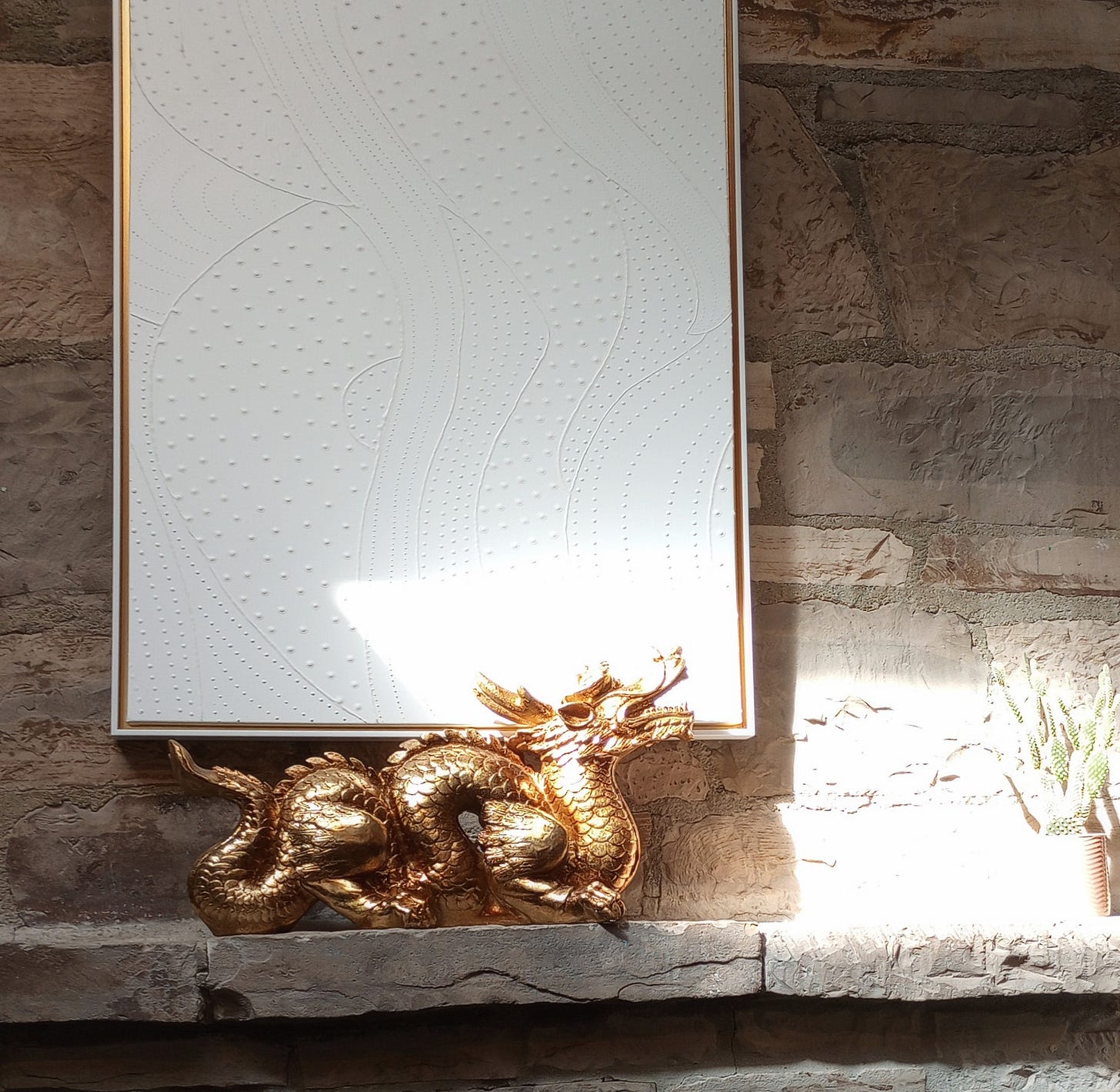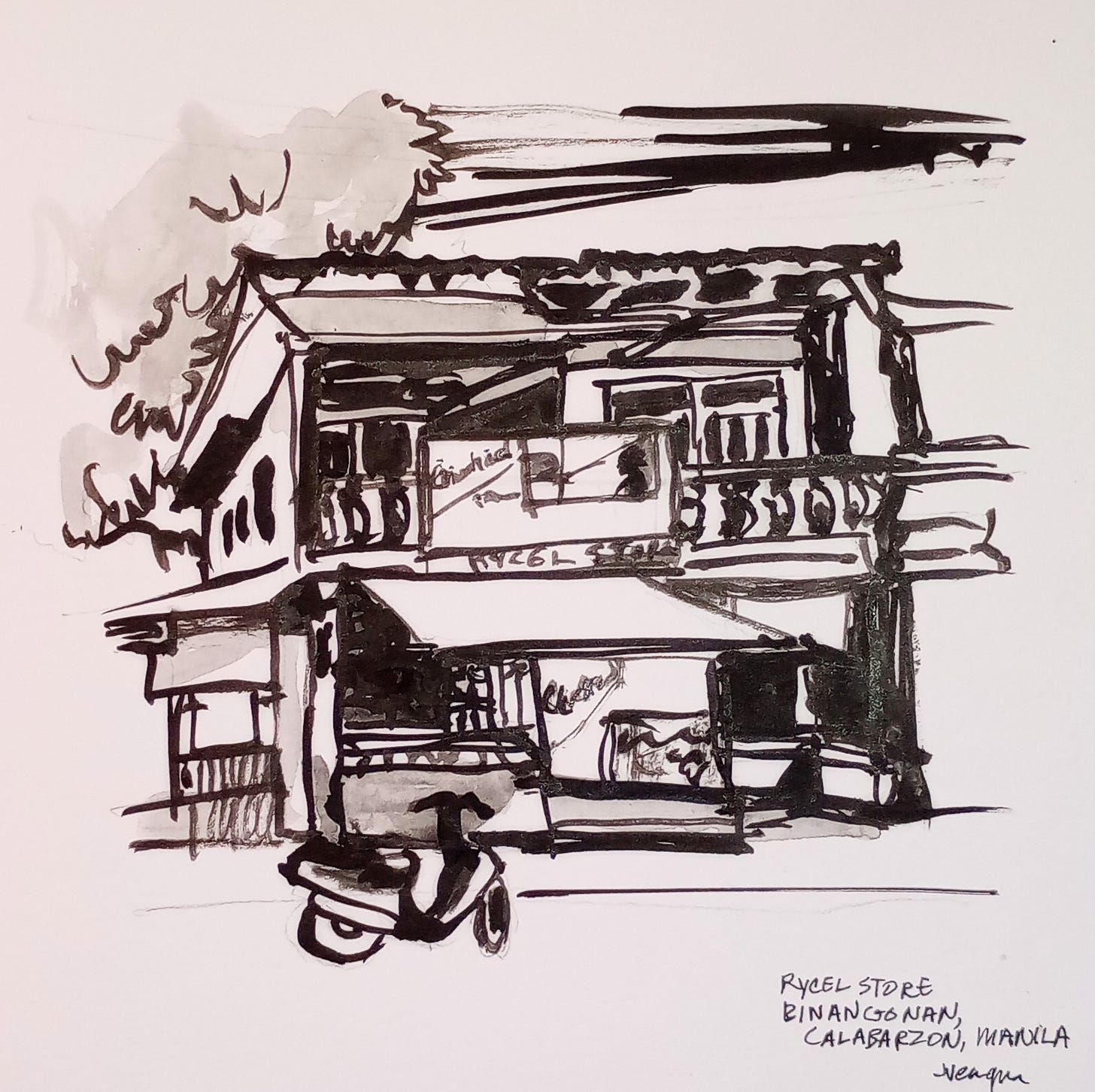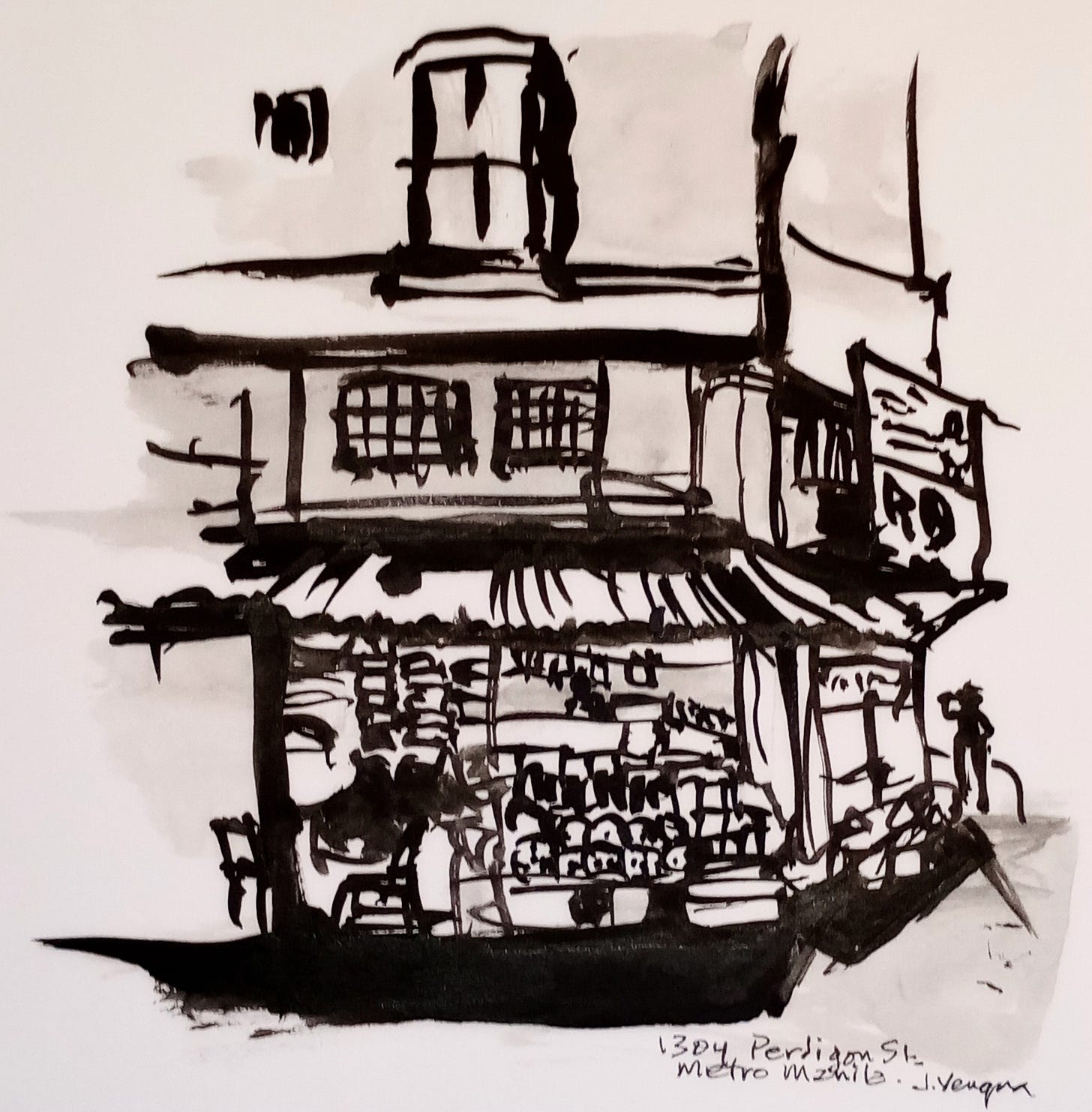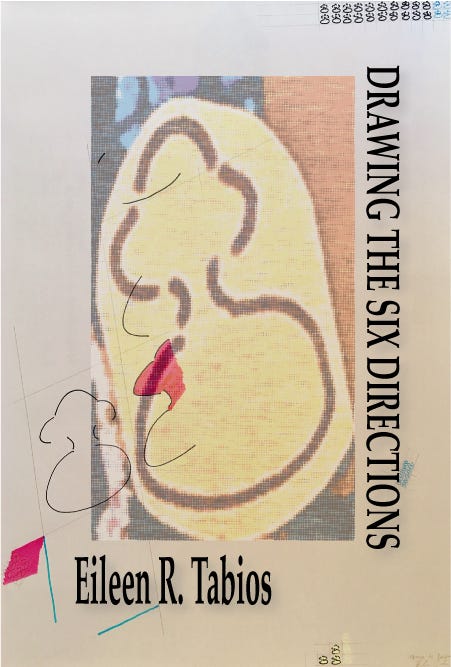Enter the Dragon Year
Here & Now (Wala Usik), Art (sari-sari), Karla & James Murray, Red Hong Yi, Zoya Scholis, Eileen Tabios, Faerul Craft, Y'egas, Eileen Myles, and Pomplamoose
HERE & NOW
A belated International Women’s Day to you. The Lunar New Year is still roaring in like a dragon. But I’m happy to report that my back injury has now healed to the point that I can walk down the hill to East Village Cafe and have samosas and iced green tea, among other things. That means I can also now walk up the hill, and probably ride my bike again.
While reading and scanning my parents post-WWII letters, I’ve been Google mapping the Philippine addresses that my parents’ families have lived at. Most of those addresses have been replaced by gas stations, hotels, tenements, or vacant lots. But as I virtually roam the barangays, I’m fascinated by the small sari-sari (variety) stores, produce stands, and carts that dot the poorer communities.
In some ways, they are analogous to the small mom-and-pop stores run by first-generation immigrants in the U.S. In the Global South, though, with fewer restrictions on storefront designs the buildings and signage are often individual and quirky, reflecting the personalities of the people and families who run them.
There is also a dark side to these small stores; while some of them sell produce and home-cooked food, snacks, and pastries, many sari-sari stands offer products packaged in single-use plastic containers and “sachets” that greatly contribute to ocean and river pollution. This is also true of American mom and pop stores that serve working-class neighborhoods.
Here in the U.S. we are beginning to learn that the promise of recycling plastic through waste management bins has been largely a fiction or even, as Laura Leebrick notes, a “betrayal.”
In the Philippines, companies like Coca-Cola and Nestle’s offer small-business training programs and other incentives especially for small, women-owned sari-sari stores, while touting their country-wide recycling programs such as Tindahan Extra Mile to prospective store owners.
However, there is also a growing climate activist movement in the Philippines, and projects like “wala usik” (nothing wasted) exist for sari-sari owners. Some residents learn about the plastics problem after becoming involved in beach and ocean conservation “sweeps.” Negros Occidental resident Laverne Traifalgar says of the project, “It’s not just a business trick because it’s more work for us. But seeing the bigger perspective, it can help not only the present but also the future generations” (Inquirer.net, Mar 9, 2024)
Wala Usik in the Island Garden City of Samal:
In these communities, sari-sari stores function, not just as places to pick up food or household items; they are also familiar establishments that bring people together in their neighborhoods. I just hope they will have more opportunities to help mitigate pollution caused by production of ubiquitous plastic containers.
ART
As I mentioned in issue #136, I’ve been doing brush & ink drawings as a way to loosen up my line, which I feel as gotten a bit myopic since the onset of the pandemic. Brush and ink forces one to see and approach mark-making differently. I’m relearning to see and to be OK with lines as suggestion, rather than detail.
I thought it might be fun to do a little series on the sari-sari stores and food carts, both in the Philippines and in the U.S. (as mom-and-pop stores). The need to work rapidly, and perhaps even crudely, with brush and ink seems appropriate, as the media embodies the fleeting nature of the subject: small stores (often run by women) and food carts that help to sustain families and function as community hangouts, eventually to be bulldozed and replaced by parking lots and high rises. The first image is done with my usual Precise V5 pen. The other two are quick brush and ink sketches:
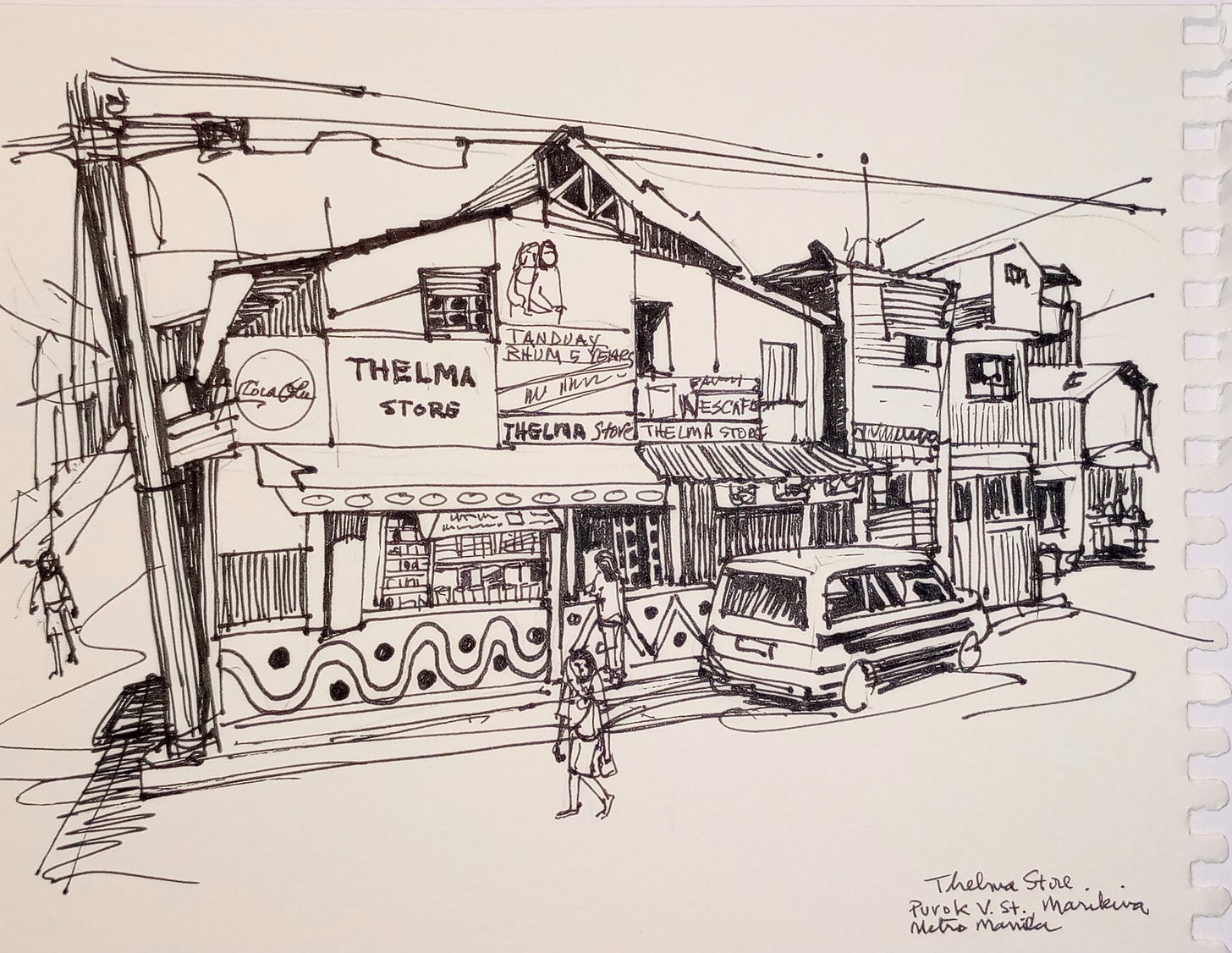
I used a “pointy” brush with the last two drawings. Next, I will experiment more with using different types of brushes.
RABBIT HOLE
Photographers Karla and James Murray celebrate the iconic mom-and-pop corner stores in an installation called Mom-and-Pops of the Lower East Side (New York):
In her installation, Once Upon a Longtang, Malaysian artist Red Hong Yi remembers the alleys, the “real authentic side of Shanghai” that she experienced when living there with her grand aunties and uncles in old Shanghai neighborhoods:
Bryant Street Gallery (Palo Alto) presents The Divine Feminine, paintings by Zoya Scholis. Several years ago, I partnered with Scholis in an art exhibit in Carmel. Below are two of her beautiful paintings from the Palo Alto show, running until April 16th. Of the two she writes, “These pieces depict women deep in thought, but placed next to each other, ‘Rebecca’ and ‘New Roommate’ seem to be at a pause in a thoughtful conversation.”
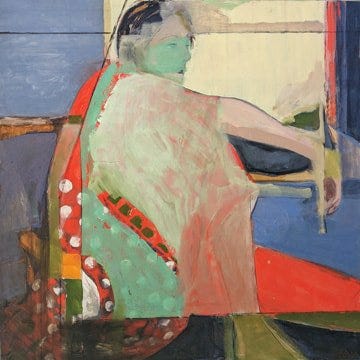
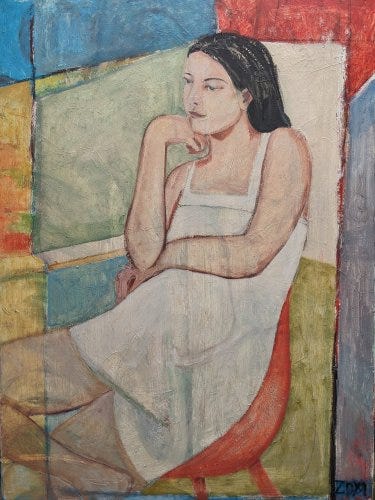
Watercolor, pen, and ink class with Zoya:
Always an explorer and innovator of the arts, poet and novelist Eileen Tabios is now expanding on her long-time interest in visual arts by including her own mixed-media artwork, made from found materials, in a new book, Drawing the Six Directions. She also edits Halo-Halo Review; keep an eye out for the next issue! Click on the image for purchasing information.
Simple visual tutorial by Faerul Craft on paper weaving, which reminds me of Philippine banig mats. I’m wondering if this would work for tiny book covers . . . another fun project.
SOUNDINGS
Celebrated T’boli singer Y’egas sings extemporaneously, making gentle fun1 of the “balikbayan American” (she’s known to occasionally be a little subversive when performing for strangers).
Rambling: Eileen Myles—an inspirational walk with the poet through the city (New York) where they talk about poetry and the writing process.
This is a rerun on this site. I just like it, so here it is again: a “Sweet Dreams”2 and White Stripes “Seven Nation Army”3 mashup, vocals by Sara Dugas and Nataly Dawn, with Pomplamoose.4
Thanks for reading/listening to Eulipion Outpost. Special thanks to my supporters for paid subscriptions to this newsletter and donations to my Ko-fi. Free and paid subscriptions are both available. If you haven’t already, please subscribe!
Check out my Neocities site for my links list.
That’s my guess (I don’t speak T’boli, but recognize “balikbayan” + “American”) after hearing the laughter and reading Benjamin Padero’s blogpost.
"Sweet Dreams (Are Made of This)” was written by Annie Lennox and Dave A. Stewart (1983), who recorded it as The Eurythmics.
“Seven Nation Army” was written by Jack White, 2003.
The group’s name is a purposely misspelled version of the French pamplemousse (grapefruit).


